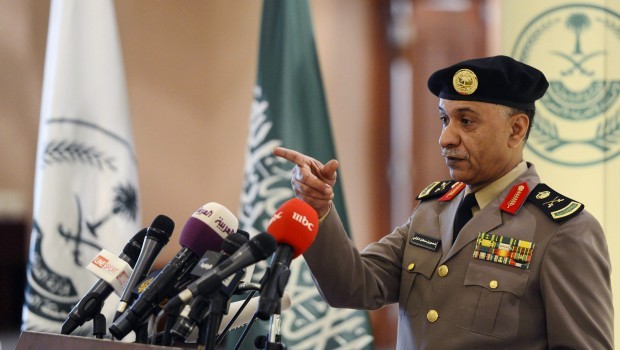
Saudi Arabia’s Interior Ministry spokesman Mansour Turki gestures during a news conference in Riyadh March 24, 2013. (REUTERS)
Riyadh, Asharq Al-Awsat—Major General Mansour Al-Turki, security spokesman for the Saudi interior ministry, has stressed that Riyadh did not point the finger at Tehran when it announced the arrest of the Saudi espionage cell last week. His clarification comes in the wake of comments carried by news agencies yesterday, with the Iranian foreign ministry denying any connection to the detainees accused of spying in Saudi Arabia. Turki said, “To name a specific state would require unequivocal evidence . . . We did not accuse anyone in particular.”
The security spokesman added that preliminary investigations into the espionage cell were not linked to staff working in oil companies, in reference to Saudi Aramco.
Regarding the presence of Saudis fighting in Syria, Turki said, “We are aware of Saudis in Syria, but we lack sufficient information about the exact number. Anyone proven to have returned from there will be arrested and investigated. Do not forget that some of them are still on wanted lists; whether in connection with Al-Qaeda or other groups, so the matter remains one we are looking into. So far we do not have specific numbers or sufficient information, but we will deal with them based on the systems we have in the Kingdom.”
In response to Asharq Al-Awsat’s question about the prosecution of gangs that are trying to smuggle large amounts of drugs into Saudi Arabia, Turki replied, “We have detected networks of multiple gangs in different areas, but the majority of attempts are individual. We always announce and prosecute if we discover the presence of organized gangs.”
Asked again by Asharq Al-Awsat on the subject of border issues, Turki stated that this, in the south in particular, is a thorny subject. He explained that there are infiltration and smuggling attempts around the clock on a daily basis, and “we are always monitoring and working to deter potential violators.”
Further elaborating on the border issue, Turki said, “The passports directorate has deported around 117,000 who entered the country illegally, while in total the security forces have thwarted the attempted infiltration of 210,000 people, half of whom were stopped by the border guards. Most of them are trying to enter Saudi Arabia through the southern border with Yemen.”
The security spokesman made these remarks during a press conference held in the Officers’ Club in Riyadh, during which he also provided the latest statistics for the Kingdom’s anti-drug measures. He revealed that the rate of arrests for possession of amphetamine tablets has decreased by 74 percent over the past four months. In contrast, Turki pointed out that arrests for possession of marijuana increased by 42 percent during 2012, and by 10 percent over the past four months. He remarked that these figures correspond, relatively speaking, with the amounts seized by Saudi customs.
The interior ministry’s security spokesman also revealed that over the past four months, the relevant security authorities have arrested 834 individuals accused of involvement in crimes of smuggling, relaying, and distributing drugs with a market value estimated at USD 352 million (SAR 1.31 billion).
A statement issued by the interior ministry yesterday indicated that during the same period 30 security men had been injured in clashes with smugglers and dealers, six of whom were killed while a further six were wounded.
The ministry reported in its statement that counter-narcotic operations over the past four months have resulted in the seizure of a total of 6.056 kilograms of raw heroin, 709 grams of heroin ready for distribution, 1.69 million amphetamine tablets, 1266 kilograms of crack cocaine, 157 grams of cocaine, 36 grams of opium, and 77,300 prescription drug pills. The operations also led to the confiscation of “13 tons of marijuana.” Finally, the ministry revealed it had seized sums of money totaling SAR 37 million.
